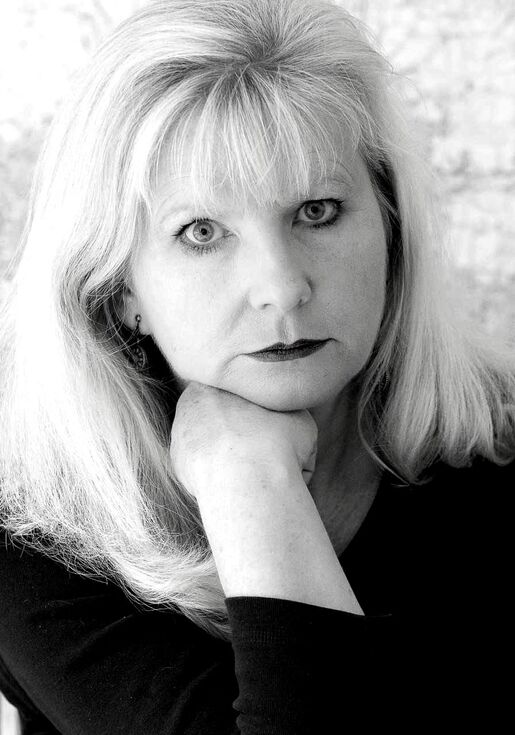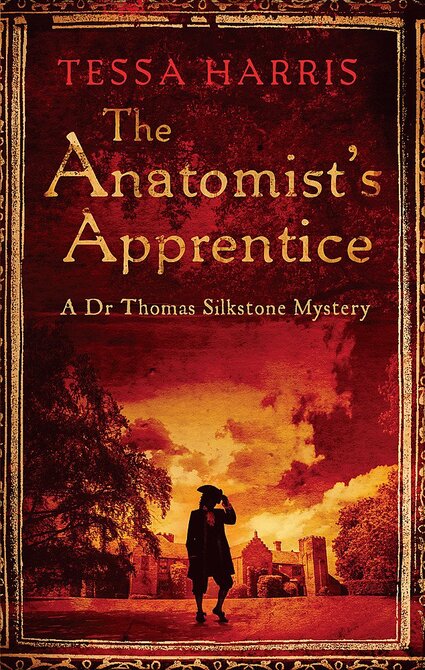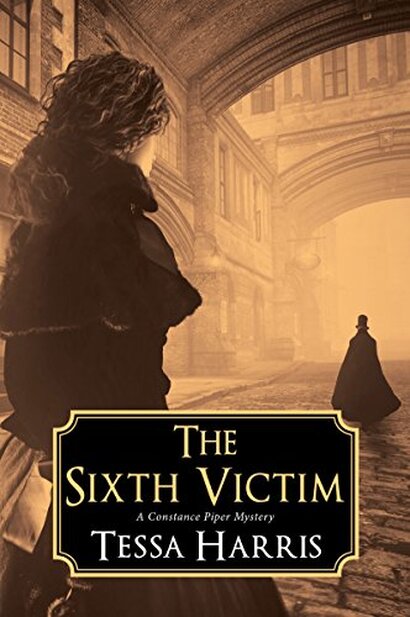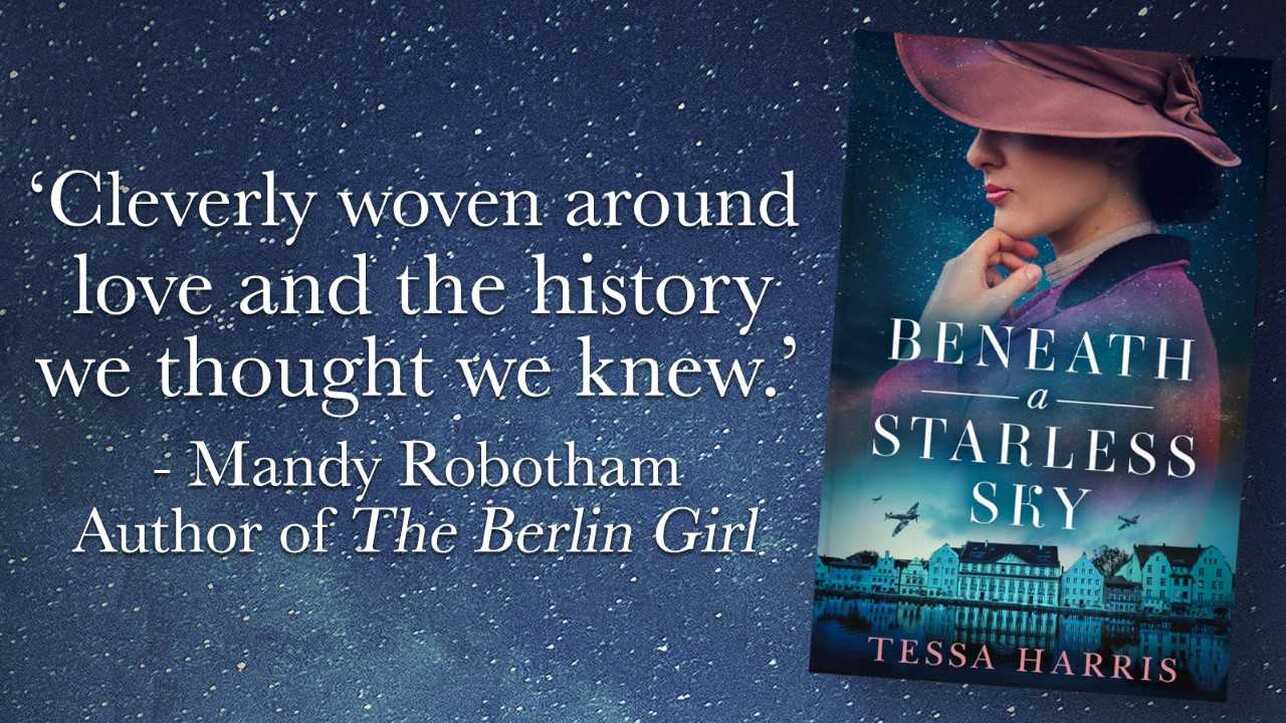
It gives me enormous pleasure to welcome Tessa Harris onto the website today. Tessa writes historical fiction and is the creator of the six-book Silkstone series featuring Dr Thomas Silkstone, an American anatomist and the world's first forensic scientist. She has also written the three-book Constance Piper series set in Jack the Ripper's Whitechapel. Her latest novel Beneath a Starless Sky has just won the Historical Fiction category of the 2021 International Book Awards.
Alex: Tell us a bit about yourself, Tessa.
Tessa: I was born in a small town, near the east coast, in Lincolnshire and ‘wrote’ my first book at five on pieces of wallpaper which my mother sewed together. I always knew I wanted to write professionally and so became a journalist. I was a journo and editor for almost thirty years before my first novel was published.
Alex: How would you describe your writing, and are there particular themes that you like to explore?
Tessa: I love writing about history and how it holds a mirror up to our society today. Without knowledge of the past, we can’t move forward. We need to learn from our mistakes – although most governments seem incapable of that! Historical novels are such a great way of learning about the past in an enjoyable and entertaining way. (I always add some crime and mystery into the mix.) Before my current WW2 novel, I’d set my stories in earlier times. My award-winning Dr Thomas Silkstone Mysteries in the 18th century and my Constance Piper Mysteries in the 19th. Themes in my novels range from the mistreatment of women, disabled people and those of colour. I suppose a search for social justice overarches most of my books. You’re supposed to mellow with age, but I seem to be doing the opposite!
Alex: Tell us a bit about yourself, Tessa.
Tessa: I was born in a small town, near the east coast, in Lincolnshire and ‘wrote’ my first book at five on pieces of wallpaper which my mother sewed together. I always knew I wanted to write professionally and so became a journalist. I was a journo and editor for almost thirty years before my first novel was published.
Alex: How would you describe your writing, and are there particular themes that you like to explore?
Tessa: I love writing about history and how it holds a mirror up to our society today. Without knowledge of the past, we can’t move forward. We need to learn from our mistakes – although most governments seem incapable of that! Historical novels are such a great way of learning about the past in an enjoyable and entertaining way. (I always add some crime and mystery into the mix.) Before my current WW2 novel, I’d set my stories in earlier times. My award-winning Dr Thomas Silkstone Mysteries in the 18th century and my Constance Piper Mysteries in the 19th. Themes in my novels range from the mistreatment of women, disabled people and those of colour. I suppose a search for social justice overarches most of my books. You’re supposed to mellow with age, but I seem to be doing the opposite!

Alex: Are you a writer that plans a detailed synopsis or do you set out with a vague idea and let the story unfold as you write?
Tessa: A bit of both really. I’d love to be a planner. I’d save weeks of work. I always have a vague roadmap but often take detours. Last year I started teaching adults how to write a novel and I learned a lot myself, including the advantages of planning!
Alex: Tell us about your latest novel.
Tessa: Beneath A Starless Sky is a novel I began thirty years ago, so I’ve lived with the characters for a very long time. It’s about a Jewish dancer, Lilli Sternberg, who dreams of leaving Munich and going to Hollywood, but those dreams are put on hold when she meets a dashing young Army officer, Marco Zeiller. When the affair ends, she is heart-broken and, leaving her family, she goes to America, finally dancing opposite Fred Astaire. When injury puts paid to her career, her new English husband offers her a very different role – fighting the Nazis. Mixing with high society and royalty, puts her in a unique position to help the British secret service, but in so doing, she risks everything, including the life of her young daughter, from whom she becomes separated. Will her gamble pay off? There’s a twist at the end that’s left a lot of readers in tears!
Tessa: A bit of both really. I’d love to be a planner. I’d save weeks of work. I always have a vague roadmap but often take detours. Last year I started teaching adults how to write a novel and I learned a lot myself, including the advantages of planning!
Alex: Tell us about your latest novel.
Tessa: Beneath A Starless Sky is a novel I began thirty years ago, so I’ve lived with the characters for a very long time. It’s about a Jewish dancer, Lilli Sternberg, who dreams of leaving Munich and going to Hollywood, but those dreams are put on hold when she meets a dashing young Army officer, Marco Zeiller. When the affair ends, she is heart-broken and, leaving her family, she goes to America, finally dancing opposite Fred Astaire. When injury puts paid to her career, her new English husband offers her a very different role – fighting the Nazis. Mixing with high society and royalty, puts her in a unique position to help the British secret service, but in so doing, she risks everything, including the life of her young daughter, from whom she becomes separated. Will her gamble pay off? There’s a twist at the end that’s left a lot of readers in tears!

Alex: What was the first book you read?
Tessa: I think it was either Peter Pan or Mary Poppins. The latter must have had a huge impact on me because I wrote my own first novel called The Adventures of Auntie Mary (about travelling with my aunt on a magic carpet) when I was just eight years old. Needless to say, it was rejected by a publisher, but I still have the letter!
Alex: Haha. I love the fact that you still have the rejection letter. How much research do you do and what does it usually entail?
Tessa: Masses! I watch a lot of films and documentaries from or about a period and read a lot of books and documents. I also go to places if I can, to soak up the atmosphere and get the little details right – although in lockdown Google Maps was a great help! For Beneath A Starless Sky, I learned a lot about wartime Germany from my German mother-in-law who had to join the Hitler Youth Movement. She is full of interesting anecdotes and helped me put a slightly different perspective on events.
Alex: Do you ever base your characters on people you have encountered in real life?
Tessa: Doesn’t every writer? I’m not usually blatant and usually combine characteristics, but yes, there are elements of people I know in many of my characters. Lilli Sternberg, for example, emerged after I interviewed the legendary Leslie Caron in person and heard about her path to stardom that led her to dancing with Astaire.
Alex: Which was the last book you read that blew you away?
Tessa: Where the Crawdads Sing, by Delia Owens. It’s not usually the sort of book I read, but it had so much hype, I thought I ought to. I’m so glad I did. Fast-paced, edge-of-the-seat and beautifully written. Tall Bones, by Anna Bailey, which I’ve just finished, is in a similar mould – great writing.
Alex: Where the Crawdads Sing is popping up a fair bit in these pages and is on my list. My wife's book club loved it, too. Well, thank you so much for sharing your writing journey with us Tessa. That evocative image of you penning your first novel on the back of wallpaper at the age of five and your mother stitching it together will stay with me for some while. I have a particularly soft spot for WW2 novels and will certainly be reading Beneath a Starless Sky in the coming months.
Tessa. Thank you Alex. It's been lovely chatting.
Tessa: I think it was either Peter Pan or Mary Poppins. The latter must have had a huge impact on me because I wrote my own first novel called The Adventures of Auntie Mary (about travelling with my aunt on a magic carpet) when I was just eight years old. Needless to say, it was rejected by a publisher, but I still have the letter!
Alex: Haha. I love the fact that you still have the rejection letter. How much research do you do and what does it usually entail?
Tessa: Masses! I watch a lot of films and documentaries from or about a period and read a lot of books and documents. I also go to places if I can, to soak up the atmosphere and get the little details right – although in lockdown Google Maps was a great help! For Beneath A Starless Sky, I learned a lot about wartime Germany from my German mother-in-law who had to join the Hitler Youth Movement. She is full of interesting anecdotes and helped me put a slightly different perspective on events.
Alex: Do you ever base your characters on people you have encountered in real life?
Tessa: Doesn’t every writer? I’m not usually blatant and usually combine characteristics, but yes, there are elements of people I know in many of my characters. Lilli Sternberg, for example, emerged after I interviewed the legendary Leslie Caron in person and heard about her path to stardom that led her to dancing with Astaire.
Alex: Which was the last book you read that blew you away?
Tessa: Where the Crawdads Sing, by Delia Owens. It’s not usually the sort of book I read, but it had so much hype, I thought I ought to. I’m so glad I did. Fast-paced, edge-of-the-seat and beautifully written. Tall Bones, by Anna Bailey, which I’ve just finished, is in a similar mould – great writing.
Alex: Where the Crawdads Sing is popping up a fair bit in these pages and is on my list. My wife's book club loved it, too. Well, thank you so much for sharing your writing journey with us Tessa. That evocative image of you penning your first novel on the back of wallpaper at the age of five and your mother stitching it together will stay with me for some while. I have a particularly soft spot for WW2 novels and will certainly be reading Beneath a Starless Sky in the coming months.
Tessa. Thank you Alex. It's been lovely chatting.

